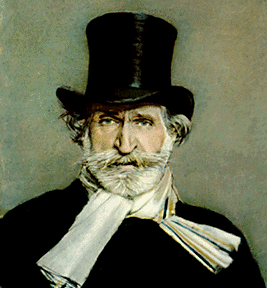October 10: Giuseppe Verdi
Giuseppe Verdi (1813)
It was on this date, October 10, 1813 – the same year as Richard Wagner – that Italian opera composer Giuseppe Fortunino Francesco Verdi was born in Roncole, Duchy of Parma, which was then under the occupation of Napoleon's army. This self-described "peasant from Roncole" began his education with local priests before the age of four. At age 19 (1832) Verdi traveled to Milan to attempt study at the conservatory, but in spite of impressive hometown credentials, he was denied admittance.
Verdi returned to Busseto, near his hometown, but was passed over for a position as maestro di cappella; instead, he became town music master in 1836. Verdi had tried to get his first opera performed in Parma or Milan. Though it was rejected, in 1839 he decided to settle in Milan, anyway. In that year Verdi's opera, Oberto, received a glowing reception at the Teatro alla Scala and he won further opera commissions.
Verdi dominated the Italian musical scene for 50 years with 28 operas, including Nabucco (Nebuchadnezzar), Macbeth, Rigoletto, Il Trovatore, La Traviata, The Sicilian Vespers (Les Vêpres Siciliennes), Simon Boccanegra, A Masked Ball (Un Ballo in Maschera), The Power of Destiny (La Forza del Destino), Don Carlos, Aïda, Otello and Falstaff. Of course he is claimed by the Catholic Encyclopedia:
Verdi deserves to be reckoned in the category of church composers; his "Requiem" (written for the anniversary of Manzoni's death) is a work of art... Among his religious compositions are: "Pater Noster"... an "Ave Maria"... a "Te Deum... a "Stabat Mater"... and two motets in honour of the Blessed Virgin. ... Verdi's Catholic spirit was shown by his resigning his office as member of the Italian parliament for Busseto; and, subsequently, when, on being appointed a senator by the King of Italy (1875), he went to Rome to be duly admitted, but never assisted at a single sitting.
In fact, Verdi was a notorious apostate and called himself an Agnostic. He angered the clergy with the anti-Catholic notes in his 1855 Sicilian Vespers. It is as superficial to claim someone must be a believer, solely on the basis of having composed religious works in the employ of the Church, as it is to claim that a crime novelist must be a criminal. Furthermore, you would be hard-pressed to find more "inspiration" in his sacred works than in his secular works.
On the other point raised by the Catholic Encyclopedia, it should be noted that Verdi's career coincided with the rise of Italian nationalism and the unification of the country, with which he gleefully associated himself. Verdi sat on the anti-clerical side in the Italian Camera or Parliament, after 1870, first as Deputy and then as Senator. Verdi himself became a rallying point: his surname, V-E-R-D-I, is the acronym of Vittorio Emanuele Re D'Italia (Victor Emmanuel, King of Italy). Clandestine partisans of Victor Emanuel circumvented the severe Austrian censorship by proclaiming "Viva VERDI," or "long live V.E.R.D.I.," which reportedly pleased the composer.
Verdi's personal character was a bundle of contradictions: He was at times brusque, demanding, economical, good-natured, humorous, modest, solitary, spirited and unapproachable. But he was conspicuously generous: in 1898 he gave 2,000,000 lire to the city of Milan to build a home for aged and infirm musicians. Before the composer died in Milan, on 27 January 1901, in defiance of the Church, he directed in his will that he was to be buried without "any part of the customary formulae."*
Verdi was buried in the Home for Musicians he himself founded. A month later his remains were removed to the Casa di Riposo, where a state ceremony was held which included members of the Italian Royal family and Parliament, and fellow composers such as Puccini, Mascagni and Leoncavallo. Arturo Toscanini conducted a choir at La Scala in singing "Va, pensiero," the famous chorus from Verdi's Nabucco – in which tens of thousands of people joined in singing as they lined the black-draped streets.
* P.T. Garibaldi, Giuseppe Verdi, 1903, p. 255.
Originally published October 2003 by Ronald Bruce Meyer.


